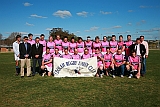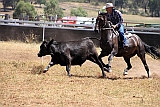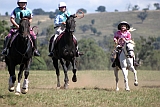Coolah is situated on the Coolaburragundy River
and nestled in a beautiful valley of the Liverpool Range. Undulating hills
and fertile river flats surround the town that has a reputation for its
fertile farming land based on rich basalt soil.
Coolah is an attractive service town for the surrounding agricultural
district with a population of 910.
Prior to white settlement the Kamilaroi and Wiradjuri peoples occupied the
Coolah valley. In 1823 explorer Allan Cunningham became the first known
European in the district when he came across Pandora’s Pass, the route over
the Warrumbungle Range on to the Liverpool Plains. The district was surveyed
in 1832 and squatters soon followed in search of fresh pastures.
The Black Stump Wine Saloon was established about 10 km north of Coolah at a
junction where the road split, heading northeast to Gunnedah and northwest
to Coonabarabran. The pub was apparently named after the nearby Black Stump
Run and Black Stump Creek. As if to strengthen the claim it is said the
Aboriginal name for the area means ‘place where the fire went out and left a
black stump’. For these reasons locals argue that the Coolah area lies at
the origin of the Australian saying ‘beyond the black stump’, meaning beyond
the limits of civilization, though it has other contenders. Today, a rest
area and replica stump mark the historic location. It contains picnic
shelters, an electric barbecue and flushing toilets.
The town site of Coolah was first occupied in the 1840s. By 1848 there was a
slab blacksmith’s and a slab hotel. Local sandstone was used to construct
more substantial buildings in the 1870s.
The railway did not arrive until 1910. Before that time, travellers to
Sydney had to journey by a horse-drawn vehicle to Mudgee, by Cobb & Co coach
to Penrith and then by rail to the city.
|
Coolah |
|
Dunedoo |
|
Merriwa |
|
Coolah Tops National Park |



